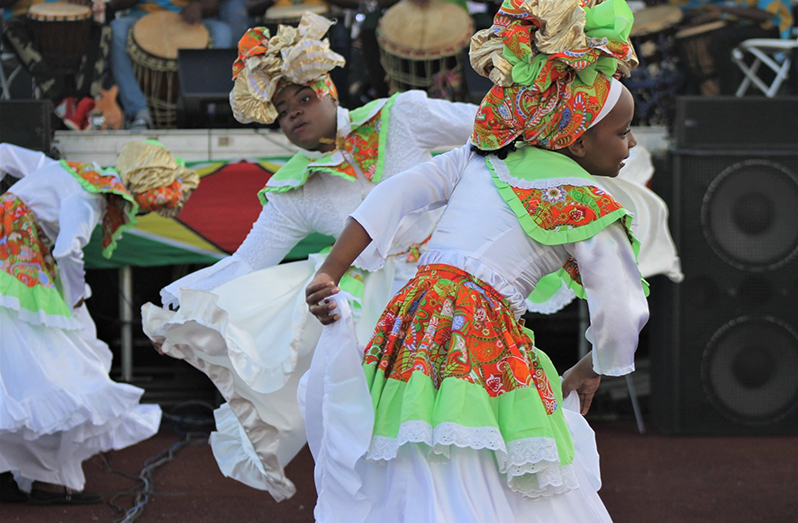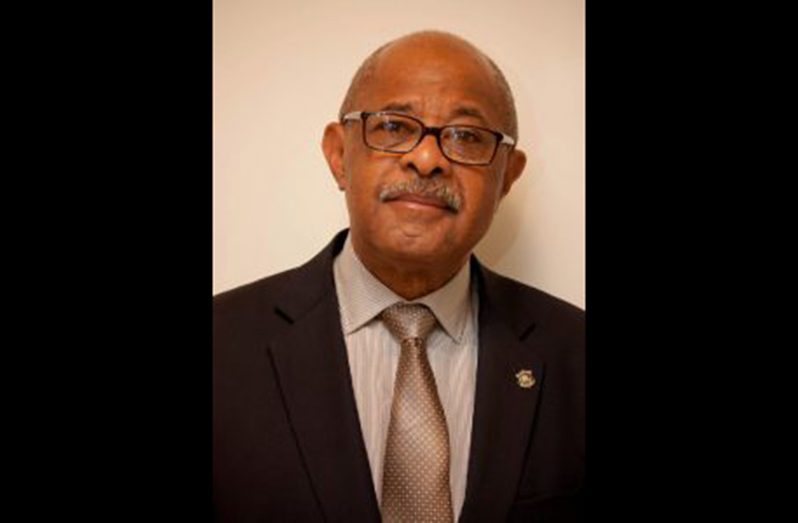THERE are certain things that define us as a people when it comes to nation-building, and among them, cultural identity stands out as being responsible for uniting people in society.
The Pepperpot Magazine recently spoke with one of the organisers of a well-loved, annual event which will be held in the United States of America among the Guyanese Diaspora, the Guyana Folk Festival. Vibert Cambridge, one of its organisers, gave a brief overview of the history of a Guyana Folk Festival and outlined some of the plans for this year’s mammoth event.
“The Guyana Folk Festival is an annual event organised by the Guyana Cultural Association of New York, Inc., a compliant not-for-profit 501(c)3 organisation. The festival has been held in Brooklyn, New York for the past 22 years. The Guyana Folk Festival organised by the Guyana Broadcasting Corporation in the early 1980s [1983] was the inspiration behind the Guyana Folk Festival which has been held annually in Brooklyn over the past 22 years,” Cambridge said.
He noted that this year’s theme focuses on CarifestaAT50: Reflections and Legacies.
Cambridge noted that the Guyana Folk Festival season usually includes and feature a set of signature events. In 2022, the Signature events are the Caribbean Summer Workshop Series (SWS). This workshop series, he explained, targets Guyanese and other Caribbean youth in New York. He noted that in 2021, the virtual Caribbean Summer Workshop Series involved participants from Joshua House and the St. Ann’s Orphanages in Guyana.
A Guyana Folk Festival’s three-day international symposium will commemorate the 50th anniversary of CARIFESTA ’72 held in Guyana. The Annual Awards Ceremony will see recipients of the Kweh – Kweh Night, who will showcase and celebrate Guyana’s rich folk culture, and the creative responses of Guyana’s root cultures to the Guyanese experience.

Additionally, the annual ceremony is being held to support and encourage the study of the commonalities in the responses of Guyana’s root cultures to the conditions they experienced in Guyana over the past 11,000 to 15,000 years.
Cambridge further added that the annual award ceremony is being held to showcase and promote contemporary Guyanese creativity and to recognise Guyanese individuals, groups, and agencies whose achievements and current work advance the GCA’s mission to recognise and celebrate Guyanese heritage and encourage and promote contemporary Guyanese creativity.
Over the past 20 years, GCA has, with the participation of the public, recognised more than 200 Guyanese and other citizens.
Cambridge noted that the Guyana Folk Festival supports inter-ethnic and intergenerational conversations among Guyana in New York, Guyanese at home, and across the Guyanese diaspora.
“It is possible to collaborate with Guyanese agencies and individuals at home to produce programs and initiatives that are beneficial for Guyanese at home and abroad. It is also [about] working with the community to co-discover commonalities in the cultural practices of improves trust—a needed factor in contemporary Guyanese life,” Cambridge told the Pepperpot Magazine.
During his interview, Cambridge explained that the Guyana Folk Festival contributes to building bridges of understanding between and among Guyanese, Caribbean and other communities in New York, supports cultural transmission, and encourages cultural confidence.
Cambridge added that the Guyana Cultural Association of New York, Inc. is proud of the work that it has done and continues to do.
“Our work over the past 22 years has raised consciousness and awareness about the scope and range of Guyanese folk expressions and contemporary creativity and supported pioneering research and publications on Guyanese social and cultural life. For example, Rohan Sagar’s work mapping Guyanese ethnomusicology, Vibert Cambridge’s 2015 book on Musical Life in Guyana, and Gillian Richards-Greaves’ 2021 book on Kweh-Kweh and “Rediasporisation” showcased and promoted Guyanese talent in New York,” he told the Pepperpot Magazine.
Over the past 22 years, the Guyana Folk Festival has hosted several Guyanese creatives from home and the diaspora. Among these creatives have been: Steve Douglas of Bravo Arts, Adrian Dutchin, Classique Dance Company NYC, Flantis and the Ninja Band, Pablo G, Terry Gajraj, Dave Martins, Gavin Mendonca, Guyana’s National Dance Company, Eze Rockcliffe, Randy Ramdin and Recklëz Tassa Group, Young Bill Rogers, and Keith Waithe.
The Guyana Cultural Association of New York, Inc. was proud to have hosted the Karao Cultural Group from Karadanau, South Rupununi to Guyana Folk Festival in 2016, when the theme was “Celebrating Our Indigenous Heritage.” The Karao Group was received warmly by the Native American community in New York City. The group “also participated in Shinnecock Annual Pow Wow and was a big hit” and contributed to the bridging of the ethnic divide through dialogue and performance. The geography of Guyanese settlement in New York has tended to reproduce some patterns from Guyana—with a concentration of Guyanese of African ancestry in Brooklyn and a concentration of Guyanese of Indian ancestry in Queens, NY. An early example of this bridging approach was the “Celebration of Guyanese drums” held in Queens in 2006. A more recent example was the performance of the Matticore ceremony by the Nirvana Humanitarian Foundation troupe from Queens, NY at Kweh Kweh Night 2019.
This was an example of cultural similarity and cultural ‘shareability’.
In 2021, the virtual Caribbean Summer Workshop Series welcomed participants from Joshua House and the St. Ann’s Orphanages in Guyana.
According to Cambridge, Guyana’s challenges are real! There is much work to be done.
“We believe that identifying and celebrating our cultural similarities is a key step in building INTERETHNIC TRUST in Guyana. So, our work is not done,” he said. “We are happy that a younger generation is taking up the mantle of leadership in the Guyana Cultural Association of New York, Inc. We will continue to reach across barriers as we celebrate Guyana’s rich folk heritage and encourage Guyanese creativity. We will continue to work with Guyanese institutions at home and across the diaspora to co-discover the cultural commonalities that connect the Guyanese people. We appreciate the scope of the task and the nature of our responsibilities. We remain optimistic.”
According to Cambridge, over the past 22 years, the Guyana Cultural Association of New York, Inc. has been actively engaged in Guyana’s cultural sector. In some cases, the group has provided continuity in the practice of politics in Guyana. A case in point is the Institute of Creative Arts (ICA). The Government of Guyana established this institution immediately after CARIFESTA 72 in response to the obvious education and training needs in Guyana’s cultural sector. By the change of government in 1992, it was also obvious that the Institute of Creative Arts needed review and overhaul. It was not until 2012, approximately 20 years later, that Dr. Frank Anthony, then the Minister of Culture, Youth, and Sports, invited Dr. Vibert Cambridge, then the President of the Guyana Cultural Association of New York to facilitate a process to reactivate the Institute of Creative Arts.
Central to the ICA is a world-class curriculum. This requires a trained faculty and opportunities for faculty and students to be internationally engaged.
The Guyana Folk Festival has been and remains an important destination for international exposure.




.jpg)









